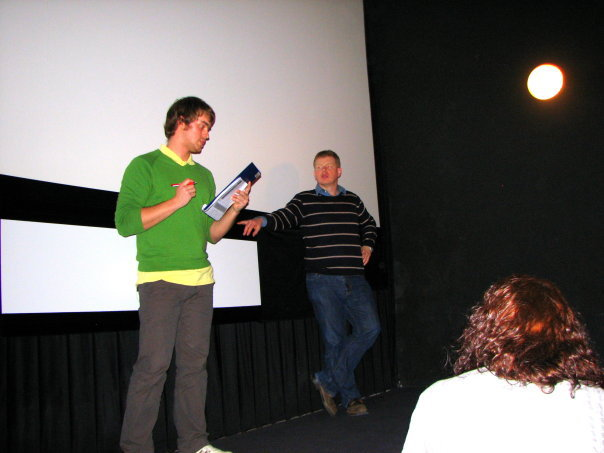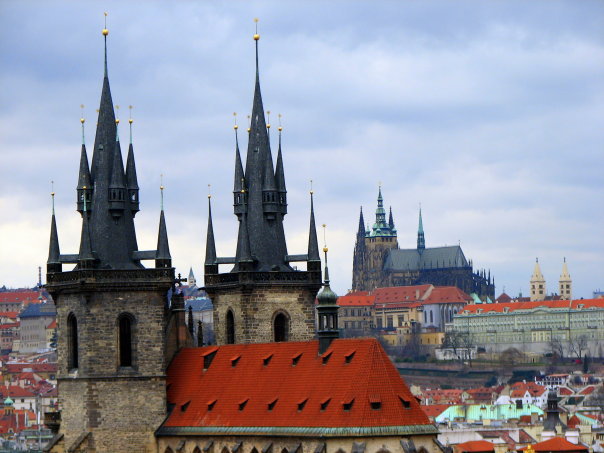Alive And Well In Prague: A Case Study Of Ex-Patriotism
When asked why they choose to leave their native soil, I’ve heard plenty of ex-patriots answer with tales of youthful days spent eagerly turning the pages of a National Geographic and dreaming. My own youthfully intrepid mind used to consistently conjure up vivid images standing on a boat’s bow peering out into an infinite sea. (My interest in National Geographic set in with puberty.)
I doubt many children dream of traveling to far off places to struggle with alcoholism, sex-addiction and depression. When asked the question, “If you could go anywhere in the world, where would you go?”, not many twelve-year-olds answer, “Someplace seedy where I can pay for sex, get cheap drugs and have no one judge me!”
In expatriate filmmaker Edward Longmire’s debut documentary, Alive and Well in Prague, these are the circumstances his camera captured as he follows four expatriates living in Prague.
The Prague Post felt the film “paints a bleak portrait of an alternately beer-soaked, smut-infused and financially grim existence for Western transplants in Prague,” and “whether this is true of all ex-pats, it is certainly true of the four souls Longmire profiled.”
Longmire’s four subjects include Stefan, an American pornographer, Francis an alcoholic English teacher, Todd an aspiring actor facing failure, and Ruth, an English teacher who stays in Prague because she “hates it less than everywhere else.”

On paper, the film feels like a Prozac prescription. Yet this seemingly grim cast of characters make for a surprisingly entertaining film which, at its debut screening, kept a steady stream of laughter coming from an audience comprised of both locals and ex-pats.
Somehow, being far away from home with mostly a limited command of the Czech language, made the subjects’ mundane problems seem more compelling. Francis was not just an alcoholic. He was an alcoholic in one of the world’s most beautiful cities. Sex-addicted Stefan, who reveled in things that might have netted him jail time in his home country, turned into a guy for whom you would root for negative test results after a day at the free clinic. The film certainly makes you hope that Stefan has gone to the free clinic and gotten himself tested.
After the film’s premier there was a question-and-answer session in which one ex-patriot asked, “What is it about Prague that keeps us here?”
Everyone seems to think that where they live is unique and different than every place else. Everyone is probably right. It’s a question I have heard asked everywhere that envelops ex-pats: What is it about Paris? What is it about Antigua? What is it about Bogotá? What is it about Portland? About Granada? About Toronto? About County Claire? Buenos Aires? What is it about the world?
The real questions are, What is it about the people who leave home to find it somewhere else.? What is it about people like Ruth, who no matter where they are, cannot seem to feel at home?
The film fails to answer this. But it doesn’t seem that was the goal of it anyways. When I sat down to a coffee with filmmaker Longmire and asked him how much of the film was a critique of his ex-pat self, he answered that “quite a lot of it” was. The pressures he felt at home in London were not to his liking: You must work in an office. You must “make it” by 25 and if you don’t make it you’re a failure.
In his family these were the options presented to him. This was the good life. The life that he should be leading. A life that he seems relieved to have left behind.
Longmire looked up from his coffee towards the sky outside, as if up there resided the very sentiments he was expressing. “A lot of people spend their lives dreaming,” he said, “But you have got to take that leap. There are not right decisions or wrong decisions. But there are ones that are better or worse for you. You’ve got to figure out what those are and make the right ones.”
That leap is the leap to define your own geography instead of letting it define you. Natural disasters, wars, and famines displace people by the millions. The ex-pat is displaced by something different entirely. Not something happening outside of him, but some yearning within him.
Though, according to the Prague Post, Longmire received criticism for selecting demoralizing and struggling subjects. He has a point when he says that “no one wants to see a film about happy successful people.”

That’s the key. It’s not a film about Prague. It’s a film about people. It’s a film about people who weren’t supposed to be there. “I’ve always been a collector,” Longmire says. Collecting people for him seems as natural as bottle caps or toe nails (hey, people do this I’m told).
The film does not have a happy ending, but neither does it end sadly. And how could it? The lives depicted in it are not over. In front of each of them are years of joys and sorrows. Longmire is able to leave his audience with the hope that their joys will outnumber their sorrows. Though the ending is not overtly promising, it leaves the audience hoping that Ruth, Francis, Stephan and Todd face down their demons and find what they are looking for. After all, we’re all hoping for the same thing in our own lives.
The cast’s conditions are not necessarily better, but they are doubtlessly wiser. “I feel like I grew up in this city,” Francis says of Prague. For better or worse, Prague was the city where they became who they are.
Life in the world is life in the world wherever you choose to lead it. In the end then, where we choose to lead our lives is a just the frame. What is really interesting to Longmire is what that frame depicts. Some people run away to escape themselves, and some do so to fix themselves. If the film shows anything at all, it shows that problems don’t disappear with a one-way ticket. But the change of scenery can make even mundane problems seems a bit more exciting. And that makes for good film, which is what Longmire delivered with Alive and Well in Prague.

About the Author
 Luke Maguire Armstrong lives in Guatemala directing the humanitarian aid organization, Nuestros Ahijados. His book of poetry, iPoems for the Dolphins to Click Home About (available for sale on Amazon.com) is especially enjoyed by people who “don’t read poetry.” (@lukespartacus)
Luke Maguire Armstrong lives in Guatemala directing the humanitarian aid organization, Nuestros Ahijados. His book of poetry, iPoems for the Dolphins to Click Home About (available for sale on Amazon.com) is especially enjoyed by people who “don’t read poetry.” (@lukespartacus)
